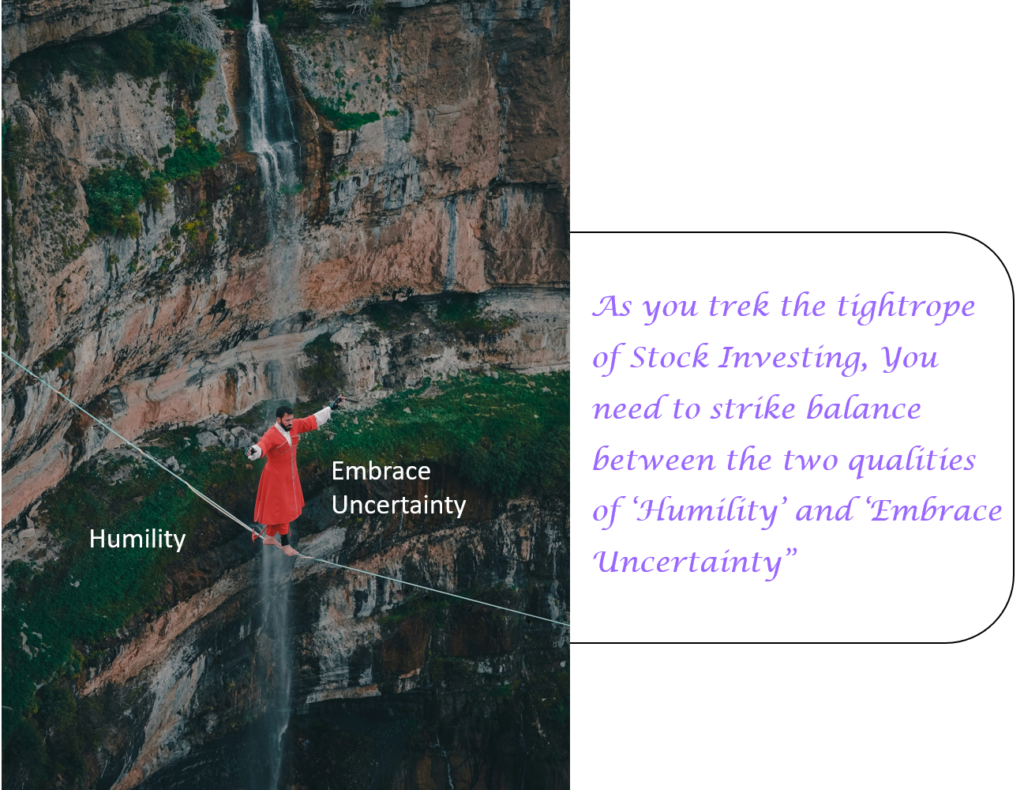In the previous blog post, we covered the significance of Patience in investing. In this blog, we will delve into two important qualities, Staying Humble and Embracing uncertainty. (Featured image credits: https://www.pexels.com/photo/person-holding-white-chalk-625219/)

Hi, This is Venkatesh. I write on Personal Finance, Stock Investing, Productivity and Time Management. You will be interested to read more about me and the purpose of my website.
If you are interested in these topics do subscribe to my blogs. You would maximum receive 4 to 5 emails a month.
Do check the blog Index page for all my previous blogs.
Stay Humble
Recognizing and accepting limitations and mistakes, and remaining open to new information and learning opportunities is the ability. Mr. William Green introduced me to this idea during a Google Talk.
Before that, I used to believe that I had learned enough or knew everything about investing, and that my analysis/framework was the best. As a result, I would even ignore discussions about opposing views on stocks that I held or analyzed, which led to several pitfalls. However, recognizing the value of humility can help investors make better decisions and avoid costly mistakes caused by overconfidence. Let’s explore this further.
Benefits of Being Humble
Avoid Overconfidence
While investing, overconfidence can be a disadvantageous trait. As a countermeasure, humility can be valuable to prevent overconfidence and complacency in one’s investment strategy. When investors are excessively confident in their abilities or overly committed to their own ideas and methods, they become susceptible to cognitive biases leading to poor/wrong decision-making resulting in suboptimal investment decisions.
Learn from Mistakes
Humility helps you to admit to yourself when a mistake is made. This in turn opens your mind to find out what went wrong, learn from the mistake, and avoid it the next time. Without this humility you become defensive or resistant to feedback. Humble investors reflect on their mistakes, and past decisions and consider how they can improve their process in the future. In essence, humility leads to an iterative and adaptive approach to investing.
My Example
I handle mistakes by turning them into lessons that I can use to improve my investing approach in future. Specifically, I update my investing framework or checklist to avoid repeating the same mistake. This could be like of checking a particular section in the annual report or analyzing a specific financial ratio etc.
One striking example of this is till a few years back, I did know much about management integrity. This did lead to a few investment mistakes. By acknowledging this mistake, I had an opportunity to learn that RPT can give many insights into management integrity. I made RPT analysis an essential part of my framework and updated my checklist to include this section when analyzing a company’s annual report.
What is the Solution?
Seek Diverse Opinions
To tackle this obstacle, one approach is to actively search for a variety of perspectives and opinions. By acknowledging your own biases and limitations and accepting that you don’t possess all the answers, you can become more open to alternative viewpoints and fresh knowledge. This, in turn, enables you to spot potential risks and opportunities that you may have otherwise missed, resulting in better-informed and more comprehensive investment choices.
Fundamental Truths
I discussed in my previous blog that there are certain fundamental truths when it comes to investing. Being aware and often remembering these fundamental truths help you to stay humble. A few such things are:
- In investing there is always more to learn, so it requires continuous learning
- You may not have all the information for analysing a stock and making an investment decision,
- It is possible that your judgement on a stock may be wrong, and
- In a discussion (related to a stock idea) the other person could be correct
- You might have developed some bias to a stock idea (This is true when you are analysing that stock for quite some time and hear only positives about the company)
By remaining humble and open-minded, investors can guard against risks and maintain a more objective and rational approach to investing.
Embrace Uncertainty
This is very crucial when you are into stock investing and more in case you are DIY investing. This is the quality where you are comfortable living with uncertainty. But that is not easy like how it is said. Because we are not used to it. One fundamental truth to realize is that, investing in stock markets inherently means embracing uncertainty.
There could be any random event like Covid event, Geo political tensions or corporate governance issue by some big conglomerate or some regulation or price cap that impacts the sector or your company. None of these can be foreseen.
As a long-term investor, you must learn to accept uncertainty in investment as part of the journey
My Example
I have experienced this several times, and one example that comes to mind is when I was studying the rating industry in India back in 2018. As part of my yearly routine, I select a particular sector and conduct a detailed analysis by reviewing the annual reports of the companies within the sector. At the time, there were only three companies in the Indian rating industry, and I concluded that the rating industry was of a gold standard with no negative points to highlight.
However, within two weeks, the thesis was completely opposite. The ILFS issue surfaced, causing the ratings to degrade, and one of the rating companies faced corporate governance issues resulting in the director resigning or being asked to go on leave, and the stock plummeting. This incident serves as a prime example of the power of uncertainty.”
What is the Solution?
Managing uncertainty in investing is critical as it can affect an investor’s decisions and ultimately their portfolio’s performance. Here are some strategies to manage uncertainty in investing:
Diversification
One of the most effective ways to manage uncertainty in investing is through diversification. To achieve this, it is recommended to spread your investments across different sectors. By doing so, you can reduce the impact of a single stock on your portfolio. However, the level of diversification should be based on your comfort level and the bandwidth you can spare to monitor your investments. Additionally, it’s advisable to limit your portfolio to no more than 15 stocks.
Research
During uncertain times, your conviction in a stock idea may be tested, leaving you unsure about whether to hold or sell. To avoid this situation, it is crucial to conduct a thorough analysis of the company before investing. This analysis should cover various parameters such as financial statement analysis, management integrity, competition analysis, growth prospects, accounting quality, reviewing market trends, and considering industry-specific factors that could impact the investment.
Focus on the Long Term
This helps you to avoid making impulsive decisions based on short-term market fluctuations. Your focus on long-term performance keeps you calm during fluctuations, short term volatility. You realize that the current happening is temporary in nature and would not hurt your portfolio on a long term basis.
Set Realistic Expectations
When discussing return expectations with my friends, I am often left feeling bewildered. Some of them expect to make x-times gain in a matter of weeks or months, with one friend even expecting his money to double in 3 to 4 months.
However, these expectations are unrealistic and often lead to disappointment when they are not met. It’s important to note that return expectations are purely individual, and managing uncertainty requires setting realistic expectations for investment returns. By doing so, you can avoid the disappointment and frustration that often arise from unmet (and unrealistic) expectations.
These few things can help manage uncertainty and stay calm during uncertain times.
Hope you found this blog useful. Kindly share my blogs with your friends, peers and fellow investors.

